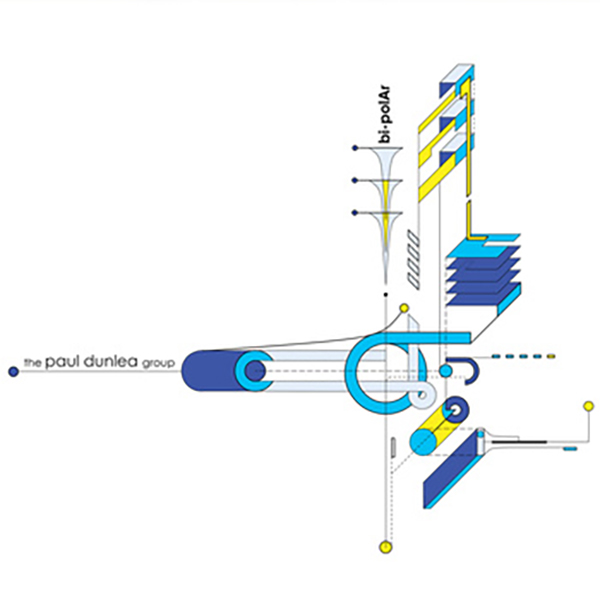
by Ian Mann
January 14, 2013
/ ALBUM
An unpretentious, meticulously crafted and ultimately very enjoyable album.
The Paul Dunlea Group
“bi-polAr”
(Spin Cycle Music)
Irish jazz currently seems to be on the rise with musicians from both sides of the border attracting attention both on the UK mainland and beyond. The list includes guitarist Mark McKnight, pianist Kevin Lawlor, trumpeter Linley Hamilton and drummers David Lyttle and Kevin Brady. Young Dublin based band ReDiviDeR have been part of the international Match & Fuse project and Hungarian born child guitar prodigy Andreas Varady (an adopted son of Ireland) has been taken under the wing of no less a figure than the hugely influential Quincy Jones.
The time has come for the name of Cork based trombonist Paul Dunlea to be added to that list. Dunlea has toured in Europe and the US with an impressive list of jazz names among them bassist Kyle Eastwood and saxophonists Bobby Watson, Rick Margitza and Jean Toussaint. He is also a talented big band player appearing with the Dublin City Jazz Orchestra and the Cork City Jazz Band among others. Dunlea has also worked as an arranger for singer/songwriter Mick Flannery, a hugely popular figure in Ireland whose “Red To Blue” album recently topped the Irish charts.
For his début album as a leader Dunlea has assembled an impressive sextet featuring some of Ireland’s leading jazz musicians including Danny Healy (trumpet/flugel), Nick Roth (soprano & alto saxes), Philip Collins (keyboards), Eoin Walsh (bass) and Davie Ryan (drums). The album also features a guest appearance by another of the Irish jazz scene’s greatest exports, saxophonist and flautist Michael Buckley. Indeed the album was recorded at Buckley’s House of Horns studio in Dublin prior to mixing and mastering at other studio locations in Cork and Los Angeles.
The playing by the sextet is excellent throughout but it’s the quality of Dunlea’s writing that really impresses. The trombonist has also written for the Dublin City Jazz Orchestra (who also have an album release in the pipeline) and his compositions possess a strong narrative arc while embracing elements of funk and r’n'b. However “bi-polAr” is primarily a jazz record and is one that should enhance Dunlea’s reputation in this area. He has already taken his group out on the road in his homeland culminating in a successful appearance at the 2012 Cork Jazz Festival.
The all original programme on “Bi-polAr” commences with “The Honeymoon Is Over” which builds from Collins’ simple opening piano vamp through Roth’s feathery soprano sax interlude, the latter subsequently blending with the rich, rounded sound of Dunlea’s trombone. Healy’s subsequent flugel solo is possessed of a similar warmth with Roth subsequently taking over to swoop and soar on soprano. The piece as a whole has a natural, unhurried feeling about it and a strong cinematic quality. Dunlea’s compositions tell good stories, a quality you might expect to come from an Irishman, and here Roth’s wispy soprano sometimes adds a folkish tinge to the music.
With Walsh on electric bass and Collins on Rhodes the title track is more obviously funky but the rich voicings of the three horns ensure that something of that cinematic quality remains. Collins takes the first solo on Rhodes followed by Dunlea on trombone and Ryan enjoys a series of drum breaks. Although less distinguished than the opener this is enjoyable music at the more sophisticated end of the funk spectrum.
The aptly titled “Twists and Turns” begins with the fruity tones of solo trombone and also deploys funk rhythms as Dunlea’s colleagues lay down an infectious groove in support of the leader’s extended trombone peregrinations. Collins and Walsh also feature with the latter enjoying a pleasantly percolating electric bass solo.
Following the two funk excursions “Sightly” (or should that be “Slightly, the spelling varies between the back and inside covers) is another example of the more pastoral side of Dunlea’s writing with a carefully scored opening for the three horns followed by a gently ruminative trumpet solo from Healy, an admirably tender alto statement for Ross and the composer’s own warmly sonorous trombone. The rich blend of horn voices and the sympathetic support from keyboards, bass and drums again gives the music a strong narrative quality with the musicians coalescing to resolve their earlier delicate musings in rousingly anthemic fashion.
At a little over three minutes “Fused” is the shortest track on the record, an invigorating piece of angular funk driven by Ryan’s drums and featuring some sparky unison lines and effervescent solos from Dunlea on trombone and Collins on acoustic piano. On the closing choruses the merger of the three horns makes the group sound bigger than it actually is.
The clipped funk of the closing “Throwback” adds Michael Buckley to the group to deliver a solo on alto flute alongside funky but eloquent statements from Roth on alto and Collins on Rhodes. The group playing is urgent and rhythmical with more strong uniform passages and the blend of electric (Rhodes and bass) and acoustic instruments works well as it does throughout the album.
Overall “Bi-polAr” is an impressive début with Dunlea displaying genuine ability as a composer with two distinct writing styles, the pastoral and the funky. However the funk/fusion element is intelligently handled and all six pieces absorb the listener’s attention throughout. Dunlea’s arrangements are consistently excellent and his pinpoint production makes for a clear, crisp sound that serves everybody well. Dunlea obviously has the ability to work across a variety of genres but this assured début will do much to establish his jazz credentials. An unpretentious, meticulously crafted and ultimately very enjoyable album.
blog comments powered by Disqus